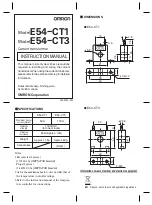
Overview
3
Precautions
Only qualified personnel or electricians should install the WattNode. Different versions of the WattNode
measure circuits with voltages from 120 VAC single-phase to 600 VAC three-phase.
These voltages are
lethal!
Always adhere to the following checklist:
1)
CCS recommends that a
licensed electrician
install the WattNode.
2)
CCS recommends that the WattNode be installed either in an electrical enclosure (panel or
junction box) or in a limited access electrical room.
3)
Verify that circuit voltages and currents are within the proper range for the WattNode model.
4)
Ensure that the line voltage inputs to the WattNode have either fuses or circuit breakers on each
voltage phase (not needed for the neutral wire).
5)
Do not install live voltage wires into screw terminals.
6)
Always connect the CTs to the WattNode before connecting the line voltages to the WattNode.
Note: in delta configurations the CT screw terminals will be at line voltage when the WattNode is
powered.
7)
Do not place more than one voltage wire in a screw terminal.
8)
Remember that the screw terminals are
not
insulated. Do not contact metal tools to the screw
terminals if the circuit is live!
9)
Before turning on power to the WattNode, ensure that all the wires are securely installed by
tugging on each wire.
10)
Do not install the WattNode in an environment where it may be exposed to temperatures below -
30°C or above 60°C, excessive moisture, dust or other contamination.
Measurement Configurations
Below is a list of different power measurement configurations, with connections and recommended
WattNode models. Note: Ground wires do not carry current except in the case of a malfunction of the
circuit being measured and are not used by the WattNode.
DANGER — HIGH VOLTAGE HAZARD
WARNING - THESE INSTALLATION/SERVICING INSTRUCTIONS ARE FOR USE
BY QUALIFIED PERSONNEL ONLY. TO AVOID ELECTRICAL SHOCK, DO NOT
PERFORM ANY SERVICING OTHER THAN THAT CONTAINED IN THE
OPERATING INSTRUCTIONS UNLESS YOU ARE QUALIFIED TO DO SO.






































